Related Research Articles
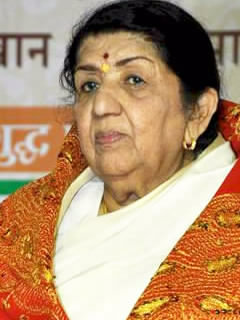
Lata Mangeshkar was an Indian playback singer and occasional music composer. She is widely considered to have been one of the greatest and most influential singers in India. Her contribution to the Indian music industry in a career spanning eight decades gained her honorific titles such as the "Queen of Melody", "Nightingale of India", and "Voice of the Millennium".

Madurai Shanmukhavadivu Subbulakshmi was an Indian Carnatic singer from Madurai, Tamil Nadu. She was the first musician ever to be awarded the Bharat Ratna, India's highest civilian honour. She is the first Indian musician to receive the Ramon Magsaysay award in 1974 with the citation reading "Exacting purists acknowledge Srimati M. S. Subbulakshmi as the leading exponent of classical and semi-classical songs in the carnatic tradition of South India. She was the First Indian who performed in United Nations General Assembly in 1966."
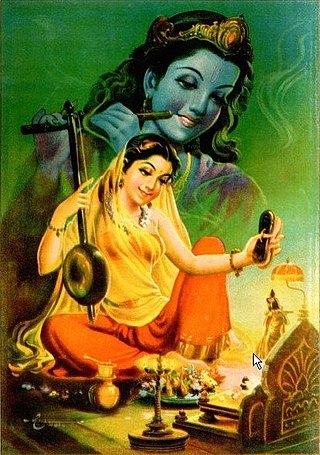
Meera, better known as Mirabai and venerated as Sant Meerabai, was a 16th-century Hindu mystic poet and devotee of Krishna. She is a celebrated Bhakti saint, particularly in the North Indian Hindu tradition.

Kishore Kumar was an Indian playback singer and actor. He is widely regarded as one of the greatest, most influential and dynamic singers in the history of Indian music. He was one of the most popular singers in the Indian subcontinent, notable for his yodeling and ability to sing songs in different voices. He used to sing in different genres but some of his rare compositions, considered classics, were lost in time. According to his brother and legendary actor Ashok Kumar, Kishore Kumar was successful as a singer because his "voice hits the mike, straight, at its most sensitive point".

Kishori Amonkar was a leading Indian classical vocalist, belonging to the Jaipur gharana, or a community of musicians sharing a distinctive musical style.

Narottama Dasa Thakura, also known as Thakura Mahasaya, was a Gaudiya Vaishnava saint who was responsible for spreading Vaishnava bhakti throughout Odisha in and outside of Bengal in India. Narottama Dasa was the son of King Krishnananda Datta and Narayani Devi who resided in Gopalpur Pargana of the Rajshahi district of Bangladesh. According to some, after the death of his father he entrusted his royal duties to the eldest paternal uncle's son and left for Vrindavana.
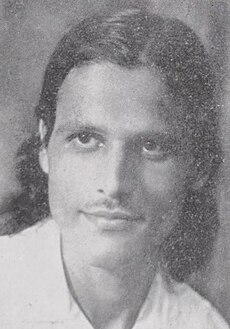
Kavi Pradeep, was an Indian poet and songwriter who is best known for his patriotic song "Aye Mere Watan Ke Logo" written as a tribute to the soldiers who had died defending the country during the Sino-Indian War.
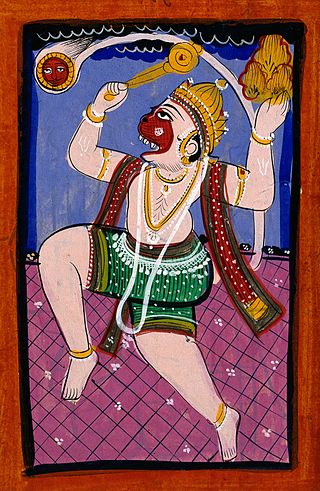
The Hanuman Chalisa is a Hindu devotional hymn (stotra) in praise of Hanuman. It was authored by Tulsidas in the Awadhi language, and is his best known text apart from the Ramcharitmanas. Apart from Awadhi, the Hanuman Chalisa is also available in various languages including Sanskrit, Kannada, Marathi, Telugu, Tamil, Gujarati and Bengali. The word "chālīsā" is derived from "chālīs", which means the number forty in Hindi, as the Hanuman Chalisa has 40 verses.

Anup Jalota, is an Indian singer, musician and actor, best known for his contributions to the Bhajan genre of Indian Music. He is popularly known as the "Bhajan Samraat". Padma Shri was conferred upon him by Government of India in 2012. He was a contestant on the reality show Bigg Boss 12.

Nitin Mukesh Mathur is an Indian playback singer known for his work as a playback singer in Hindi films as well as Bhajans. He has toured internationally, including to the United States in 1993, and a world tour in 2006 with his show Kal Ki Yaadein as a tribute to his father Mukesh.
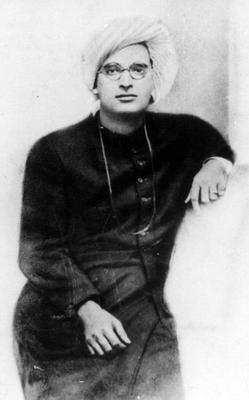
Dilip Kumar Roy, also spelt Dilipkumar Roy, was an Indian musician, singer, musicologist, novelist, poet, essayist and yogi. He was the son of Dwijendralal Ray. In 1965, the Sangeet Natak Akademi, India's National Academy for Music, Dance and Drama, awarded him its highest honour for lifetime achievement, the Sangeet Natak Akademi Fellowship.

Suresh Ishwar Wadkar is an Indian playback singer. He performs in both Hindi and Marathi films. He has sung songs in some Bhojpuri films, Odia albums and bhajans and in Konkani films.
"Vaishnava Jana To" (meaning:- Call those people Vaishnav or The devotee of Vishnu) is a Hindu bhajan, written in the 15th century by the poet Narsinh Mehta in the Gujarati language. The poem speaks about the life, ideals and mentality of a Vaishnava jana.
Raga : Mishra Khamaj
"Raghupati Raghava Raja Ram" is a bhajan widely popularised by Mahatma Gandhi and set to tune by Vishnu Digambar Paluskar in Raga Mishra Gara.
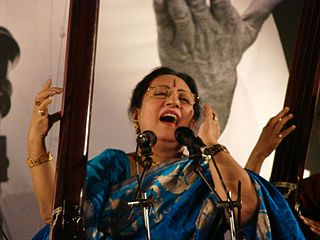
Begum Parveen Sultana is an Indian Hindustani classical singer of the Patiala Gharana. She was awarded the Padma Bhushan by the Government of India in 2014 and the Sangeet Natak Akademi Award by the Sangeet Natak Akademi in 1998.

Hari Om Sharan was an Indian Hindu devotional singer and lyricist. He devoted most of his career to singing devotional songs in praise of Sita, Rama, and Hanuman. As a Bhajan singer in the 1970s he recorded albums such as Premanjali Pushpanjali, and Daata Ek Ram. During his musical career spanning over 35 years, he released over 20 Bhajan albums.

Prajakta Shukre is an Indian singer who works in Bollywood films and has appeared on reality shows.

Meera is a 1945 Indian Tamil-language musical drama film directed by Ellis R. Dungan, produced by T. Sadasivam and written by Kalki Krishnamurthy. Based on the life of the 16th century mystic and poet Mirabai, the film stars M. S. Subbulakshmi as the eponymous character, a zealous devotee of Krishna, who considers him to be her husband. Despite marrying Rana, she follows her own way of living, which is unacceptable to her husband and his family.

"Shri Ramachandra Kripalu" or "Shri Ram Stuti" is a Stuti verse from the his work called Vinaya Patrika, written by Goswami Tulsidas. It was written in the sixteenth century, in a mix of Sanskrit and Awadhi languages. The prayer/ode glorifies Shri Rāma and his characteristics to the best.

Srimathumitha is an Indian playback and Carnatic singer who sings mainly in Tamil. She has also sung in Telugu, Hindi and Kannada songs. Some of her notable songs are "Azhage Azhage" from the movie Oru Kal Oru Kannadi, "Valayapatti Thavile" from the movie Azhagiya Tamil Magan, "Kanaa Kaanum Kalangal" from the movie 7G Rainbow Colony, and "Rathathin Rathame" from the movie Velayudham. She is one of the leading playback singers in today’s film music scenario. She has sung for leading music directors like Ilayaraja, Harris Jayaraj, Yuvan Shankar Raja, A. R. Rahman, Bharathwaj, Deva, S. A. Rajkumar, and Bharani. She emerged as the "Best Voice of 2002" in the TV Reality Show Rajageetham conducted by RAJ TV. She is the first playback singer to win the Vikadan Awards started in 2004, which was juried by late Sujatha. A. R. Rahman has featured her in 2 songs in the soundtrack of Oscar-winning movie Slumdog Millionaire.
References
- ↑ Menon, Nitya (18 September 2014). "When the Queen of Song captured the West". The Hindu. Retrieved 30 September 2014.
- ↑ Narayan, M.K.V. (1 January 2010). Lyrical Musings on Indic Culture: A Sociological Study of Songs of Sant Purandara Dasa. Readworthy. pp. 53–. ISBN 978-93-80009-31-5.
- 1 2 Murthi, R.K. Encyclopedia of Bharat Ratnas. Pitambar Publishing. pp. 179–. ISBN 978-81-209-1307-3.
- 1 2 Ahuja, M. L. (2006). Eminent Indians : Musicians. Rupa & Company. pp. 32–. ISBN 978-81-291-1015-2.
- ↑ "Subbulakshmi, M. S.: Biography". Ramon Magsaysay Award Foundation. Archived from the original on 6 October 2014. Retrieved 30 September 2014.
- ↑ "Hari Tum Haro - M. S. Subbulakshmi". Archived from the original on 19 December 2021.
- ↑ "Hari Tum Haro - Jagjeet Singh". Archived from the original on 19 December 2021.